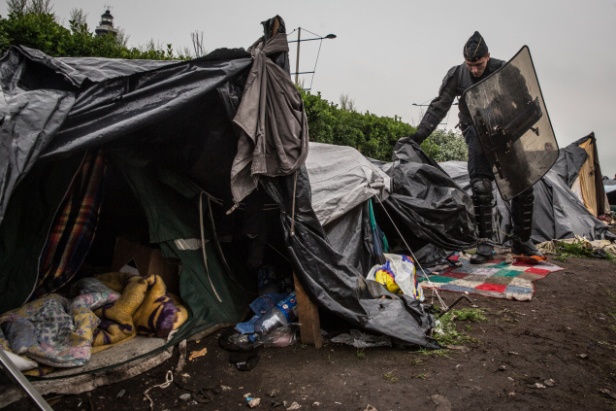“Salvation comes to us in the form of a tired traveller.”
-Henri Nouwen
I thank God that so many are saying we need to help the refugees, even as many others are singing the right wing media’s tune and saying no we don’t need to help the refugees. What I want to say is that I think we need the refugees. We need them to help us. The Britain I know and love is in a very deep hole, and if anyone in the world today can save us from our situation, it is the refugees.

The Desire to Remain Unchanged is Delusional and Destructive
Those who are resisting calls to welcome refugees into our country are motivated primarily by the desire to be unchanged by the state of war that is destroying parts of the Middle East and North Africa. They are afraid that we will be poorer, more crowded and less “British.” Indeed the government see it as their job to prevent our being changed.
But the hope to remain unchanged is delusional and destructive.
It’s delusional because it’s based on the denial of the obvious. Everything is changing whether we like it or not. The old order of things is passing. Ask Peter Hitchens (who is quite frank about the futility of his own winging). We are entering a time when the world will be increasingly mixed up and indeed a time when we can no longer maintain our imperialistic power relations with Middle Eastern countries. The sad irony is that, for most of us, life in our own country has been a routine exercise in daily alienation, structural injustice and cultural oppression, and yet so many of us are defending this miserable order of things, as though it stood for us. It doesn’t.
The hope to remain unchanged is also destructive, because, even if we succeed, by some bitter and twisted effort, in keeping all this suffering out – if we really manage to remain untouched by this terrible war – we will nevertheless be utterly changed in the process. We will deteriorate into a socially and morally disfigured society: a boat meaningless privilege sailing through an ocean of corpses. Our hard won security from the terrible other will be ashes in our mouth and we will continue on our present trajectory towards a soulless and lobotomised mirage of stability.
In any case, we have no right to remain unchanged by this crisis. Our wars in Iraq and Afghanistan, our addiction to certain resources from the Middle East, and our habit of selling arms to Middle-Eastern regimes, make us utterly complicit in the situation. We will be changed by it: the only question is, how? Will we sink deeper into the alienation of empire? Or will we come to terms with our predicament and find some unexpected opportunity to be transformed and rehumanised by this crisis of human suffering that we’re locked into?
From What Predicament Must We Be Saved?
Our predicament is one of greed, imperialism, racism and alienation.
Greed, because our level of consumption is unsustainable. If everyone lived as we do, I’m told we would need four worlds. Our wealth necessitates other people’s poverty.
Imperialism, because our foreign policy, arms trade and our oil addiction have created catastrophic political instability for Middle Eastern peoples.
Racism, because the media powers we uphold over ourselves have normalised a degree of racism since it suits them to find poor foreign scapegoats for the inequality that they themselves help to perpetuate against us.
And alienation, because life on the ground has become an alienating routine of work, sleep and numbing consumerism which has all but destroyed our community life. British life has been in a sort of glitter-sprinkled, numbing pathos for decades now.
These are four manifestations of the basic competitive hostility that has underpinned and withered British life. The first two are active, and the latter two are passive. While many communities fight the good fight and there are glimmers of hope everywhere, so much grassroots British life has been held mercilessly down in this basic world view of competitive hostility – the war of every man against every man – and it has has come close to defining our way of being as a people.
How Can the Refugees Save Us?
Firstly, it is absolutely necessary that we become poorer, and the refugees will help the west to redistribute wealth. Perhaps you’re having a panic attack now, but the fact is, there is not enough for everyone if we live as we currently do. Notice that relatively poor nations are taking in refugees by the million. It is rich nations like ours, and Saudi Arabia, and Kuwait who have bolted the door, turned out the lights and are all hid under the kitchen table pretending no one’s home. Yes, “it is hard for a rich man to enter the Kingdom of Heaven.” I hasten to add that I don’t think the poor among us should be made any poorer, but that ordinary western life needs to move towards greater simplicity, greater interdependence in communities and less waste. Ultimately I believe this will enrich the poor among us and provide an escape route from the financial and social poverty that come with our alienating myth of consumer individualism.
Second, the refugees confront us with the fruits of our imperialism, and if we are willing to face up to their stories we may finally accept the challenge of finding an alternative route into the future – one that isn’t dependent on oil and or on the economic boost we gain from the arms trade.
Third, they give us an opportunity to overcome the racism that now dominates so much of our politics and media, simply by being the human other in our midst. I believe that we will not lose a sense of who we are in the presence of the other. Rather, we will gain a deeper sense of who we are, as we gain a deeper appreciation of the other.
And lastly (and most of all) the refugees will help to reconfigure British social life and politics through the grass roots community cooperation that is now necessary to respond to this crisis. Community cooperation is necessary now because a) the powers are not invested in the future, but in the present (the era in which they hold power) – they will not do what must be done. And b) because community cooperation is precisely what has been chased out of British life by numbing consumerist order of the last decades – and it is precisely this that has left us bereft of any sense of who we are. Functional and compassionate communities will be the most important political spaces in the future. If we don’t rise to this, we will remain locked in a stagnant and dying imperial past.
Why The Government Can’t Save Us
The government are almost completely unable to help us. Rather, we must help them by changing the assumptions under which they operate. The government have been a driving force of the greed, imperialism and social alienation that now characterise Western life, and racism is a tolerated side-effect. More than that, the government’s fear of the big newspapers (The Sun and The Mail) means that they are an obstacle to the refugees that we so sorely need to help. But lastly, even the refugees that the Government does let in will do us no good if the government oversees their life in this country.
We have to recognise now, that nobody’s humanity or dignity will be preserved if refugees are to be minced through government bureaucracy into dire council houses where they will live on a pittance, secluded and alienated and suffering continual racism and prejudice, only to be finally deported at the age of 18 if they are unfortunate enough to be orphans. The housing, social integration and provision of resources for refugees must be handled by welcoming grass-roots communities who are invested in their humanity and are willing to be changed by them. These grass roots communities, who will most likely be faith communities, must then include the wider community so that we, as a people, can be changed by encountering the other, can be grieved by their stories, can be heartened by their newfound stability and the part we are able to play in it. We could be transformed from a people of television and entitlement to a people of life, culture and hospitality once again: a people who’s core values are not dictated from the heart of capitalist economics but from a compassionate connection to the other.
What Should We Do?
If any of us have any enthusiasm about the opportunity to begin transforming British life from the grass roots upwards, then I encourage you to get involved with Citizens UK, to lobby your local councils to accept refugees, to consider how you could make yourself available to spend time with refugees and help them to settle and integrate and be welcomed, and to explore fund-raising activities that will involve the wider community.
This is not merely a crisis. This is the beginning of the world to come. And so I think it will be fruitful to respond to this in a steady, considered and committed way – to re-position ourselves gradually. If our own country is to be a good and beautiful place in the future, much depends on our response to the weary traveller. The current powers will make nothing but the most begrudging response, and so hope now depends on ordinary people in ordinary communities.
Our opening quote from Henri Nouwen, doubtless refers to Jesus’ story about the judgment (Matthew 25:31-46) where he tells one group of people “I was a stranger and you welcomed me.” And they say “When?” and he says “Whenever you did it for the least of these.” Then he talks to the other group of people, and it doesn’t go so well.
As I’m sure is already clear, I don’t consider this to be religious mysticism so much as a concrete political reality that stands before us: “salvation comes to us in the form of a tired traveller.”

